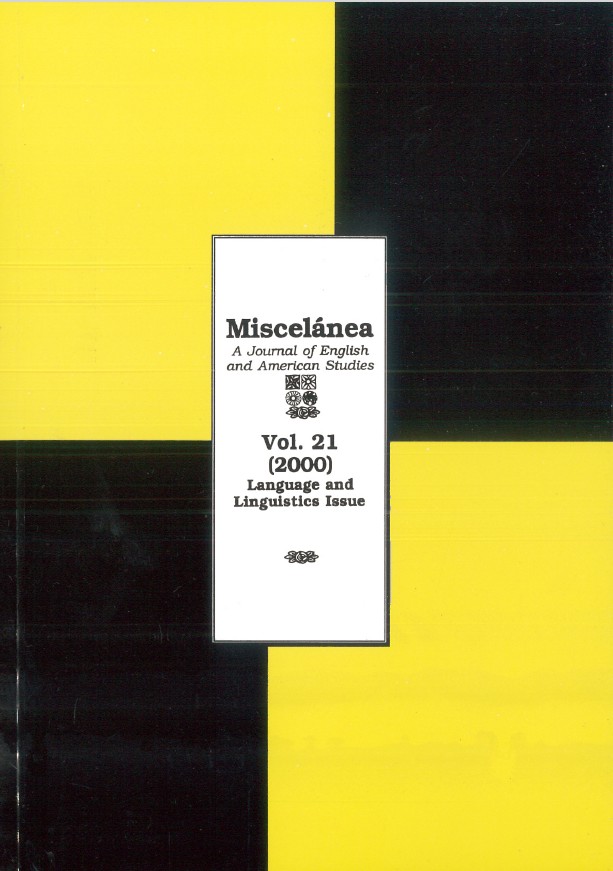El uso de la teoría pragmática de la cortesía en la interpretación de «Colinas como elefantes blancos» de Hemingway
DOI:
https://doi.org/10.26754/ojs_misc/mj.200011005Palabras clave:
cortesía pragmática, diálogo ficticio, interpretación, género, negociaciónResumen
En la interpretación de un texto literario, sobre todo si la información facilitada por el autor es insuficiente, es necesaria la reinterpretación mediante inferencias. Los conocimientos previos del lector suelen condicionar su interpretación, por lo que el texto se presta a una interpretación subjetiva. Si aceptamos que el diálogo literario es otra forma de comunicación social, la Teoría Pragmática puede sernos de ayuda a la hora de estudiar textos como «Colinas como elefantes blancos», donde las palabras pronunciadas por los personajes son la clave del significado de la historia. En este artículo, utilizaré principalmente la teoría de la cortesía de Brown y Levinson para analizar las estrategias empleadas por los dos interactuantes en un intento de trazar un perfil de las motivaciones que subyacen a su comportamiento lingüístico y ofrecer una interpretación menos arbitraria del texto.
Mostras las descargas
Referencias
ANDERSON, R. C. et al. 1977. “Frameworks for Comprehending Discourse”, American Educational Research Journal 14: 367-381. DOI: https://doi.org/10.3102/00028312014004367
BROWN, G. and G. YULE. 1983. Discourse Analysis. Cambridge: Cambridge U. P. DOI: https://doi.org/10.1017/CBO9780511805226
BROWN, P. and S. C. LEVINSON. 1987. Politeness: Some Universals in Language Use. Cambridge: Cambridge. U. P. DOI: https://doi.org/10.1017/CBO9780511813085
BURTON, D. 1980. Dialogue and Discourse. A Sociolinguistic Approach to Modern Drama Dialogue and Naturally Occurring Conversation. London: Routledge & Kegan Paul.
COULTHARD, M. 1987. An Introduction to Discourse Analysis. New York: Longman.
ECO, U. 1987. Lector en Fabula: la Cooperación interpretativa en el texto narrativo. Barcelona: Lumen.
ELAM, K. 1980. The Semiotics of Theater and Drama. London: Methuen. DOI: https://doi.org/10.4324/9780203993309
FAIRCLOUGH, N. 1991. Language and Power. London: Longman.
GOFFMAN, E. 1967. Interaction Ritual: Essays on Face to Face Behavior. New York: Garden City.
GUILLÉN NIETO, V. 1998. “Pragmatics and Dramatic Discourse: the Power of the Unsaid”. In Vázquez, I and I. Guillén. (eds.). Perspectivas pragmáticas en lingüística aplicada. Zaragoza: Anubar Ediciones: 49-54.
HAAS, A. 1979. “Male and Female Spoken Language Differences”. Psychological Bulletin 86 (3): 616-626. DOI: https://doi.org/10.1037//0033-2909.86.3.616
HAYS, R. B. 1984. “The Development and Maintenance of Friendship”. Journal of Social and Personal Relationships 1: 75-98. DOI: https://doi.org/10.1177/0265407584011005
HEMINGWAY, E. (1935) 1987. “Hills like White Elephants”. In The Complete Short Stories of Ernest Hemingway. New York: Macmillan: 211-214.
HERMAN, V. 1995. Dramatic Discourse. Dialogue as Interaction in Plays. London: Routledge.
HSU, F. L. K. (ed.). 1985. “The Self in Cross-cultural Perspective”. In Culture and Self: Asian and Western Perspectives. New York: Tavishock Publications.
KUNDERA, M. 1994. Los testamentos traicionados. Trad. B. de Moura. Barcelona: Tusquets.
LEECH, G. 1983. Principles of Pragmatics. London: Longman.
MAO, R. L. 1993. “Beyond Politeness Theory: “Face” Revisited and Renewed”. Journal of Pragmatics 21: 451-486. DOI: https://doi.org/10.1016/0378-2166(94)90025-6
MATSUMOTO, Y. 1988. “Reexamination of the Universality of Face. Politeness Phenomena in Japanese”. Journal of Pragmatics 12: 403-426. DOI: https://doi.org/10.1016/0378-2166(88)90003-3
SACKS, H., E. A. SCHEGLOFF, and G. JEFFERSON. 1978. “A Simplest Systematics for the Organization of Conversational Interaction”. In Schenkein, J. N. (ed.). Studies in the Organization of Conversational Interaction. New York: Academic Press: 7-55.
SMILEY, P. 1990. “Gender Linked Miscommunication in “Hills like White Elephants”. In Benson, J. (ed.). New Critical Approaches to the Short Stories of Ernest Hemingway. Durham and London: Duke U. P.: 287-299. DOI: https://doi.org/10.1215/9780822382348-025
TANNEN, D. 1991. You Just Don't Understand: Women and Men in Conversation. London: Virago.
WIERZBICKA, A. 1985. “Different Cultures, Different Languages, Different Speech Acts: Polish versus English”. Journal of Pragmatics 9: 145-157. DOI: https://doi.org/10.1016/0378-2166(85)90023-2
Descargas
Publicado
Número
Sección
Licencia
Derechos de autor 2000 Enrique Lafuente Millán

Esta obra está bajo una licencia internacional Creative Commons Atribución-NoComercial 4.0.


